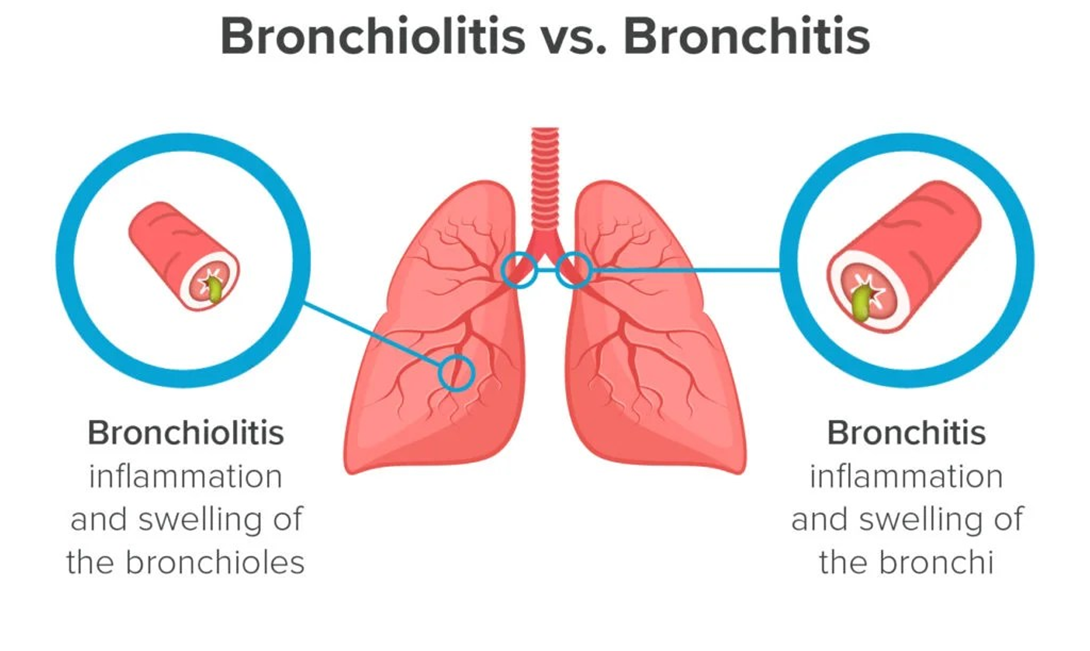A nurse is monitoring an infant who is 6 months old and has sneezing, coughing, nasal congestion, intermittent fever, and apneic spells. The nurse should recognize these findings are consistent with which of the following diagnoses?
Epiglottitis
Bronchiolitis
Influenza
Croup
The Correct Answer is B
Choice A reason: Epiglottitis is a life-threatening condition that causes inflammation and swelling of the epiglottis, the flap of tissue that covers the entrance to the trachea. It can block the airway and cause respiratory distress. The signs and symptoms of epiglottitis include drooling, dysphagia, dysphonia, high fever, and tripod position. Epiglottitis is rare in infants and more common in children aged 2-6 years.
Choice B reason: Bronchiolitis is a viral infection that causes inflammation and mucus production in the bronchioles, the smallest airways in the lungs. It can impair gas exchange and cause respiratory distress. The signs and symptoms of bronchiolitis include sneezing, coughing, nasal congestion, wheezing, tachypnea, retractions, and apneic spells. Bronchiolitis is common in infants and children under 2 years of age, especially during the winter months.
Choice C reason: Influenza is a viral infection that affects the respiratory system. It can cause fever, chills, headache, muscle aches, fatigue, sore throat, cough, and nasal congestion. Influenza can also lead to complications such as pneumonia, otitis media, and sinusitis. Influenza is common in children and adults of all ages, especially during the flu season.
Choice D reason: Croup is a viral infection that causes inflammation and narrowing of the larynx and trachea. It can cause a characteristic barking cough, hoarseness, stridor, and respiratory distress. Croup is common in children aged 6 months to 3 years, especially during the fall and winter months.

Nursing Test Bank
Naxlex Comprehensive Predictor Exams
Related Questions
Correct Answer is C
Explanation
Choice A reason: This statement is normal, as an infant who is 2 months old should be alert and responsive to stimuli. The nurse should assess the infant's level of consciousness and responsiveness using the AVPU scale (alert, voice, pain, unresponsive).
Choice B reason: This statement is normal, as an infant who is 2 months old should have warm and dry skin and a tone that is appropriate for their ethnicity. The nurse should assess the infant's skin color, temperature, moisture, and turgor.
Choice C reason: This statement is abnormal, as an infant who is 2 months old should not have a distended abdomen or a visible mass in the right upper quadrant. This could indicate a serious condition such as a liver tumor, a bowel obstruction, or a hernia. The nurse should report this finding to the provider and monitor the infant for signs of pain, vomiting, or jaundice.
Choice D reason: This statement is normal, as an infant who is 2 months old should have full range of motion in their extremities and no clicks noted. The nurse should assess the infant's muscle strength, tone, and symmetry, and check for any signs of hip dysplasia, such as a positive Barlow or Ortolani test.
Correct Answer is A
Explanation
Choice A reason: This is the best option to prevent the toddler from touching or injuring the surgical site. The nurse should apply soft padded restraints and check the circulation and skin integrity of the wrists frequently.
Choice B reason: Offering fluids through a straw is not recommended for a toddler who has had a cleft palate repair, as it can cause suction and pressure in the mouth that can disrupt the sutures. The nurse should offer fluids with a cup or a spoon.
Choice C reason: Implementing a soft diet is not appropriate for a toddler who has had a cleft palate repair, as it can cause irritation and infection in the mouth. The nurse should provide clear liquids for the first 24 hr and then advance to full liquids as tolerated.
Choice D reason: Administering opioids for pain is not the first choice for a toddler who has had a cleft palate repair, as it can cause respiratory depression and constipation. The nurse should use nonpharmacological methods such as distraction, comfort, and reassurance first, and then administer acetaminophen or ibuprofen as prescribed.
Whether you are a student looking to ace your exams or a practicing nurse seeking to enhance your expertise , our nursing education contents will empower you with the confidence and competence to make a difference in the lives of patients and become a respected leader in the healthcare field.
Visit Naxlex, invest in your future and unlock endless possibilities with our unparalleled nursing education contents today
Report Wrong Answer on the Current Question
Do you disagree with the answer? If yes, what is your expected answer? Explain.
Kindly be descriptive with the issue you are facing.
